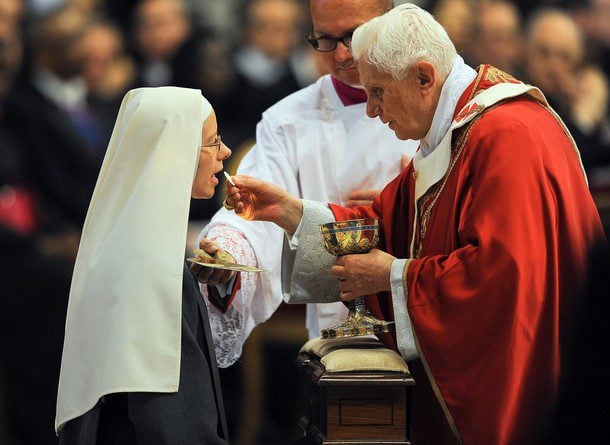
Heralding the swift-rising dawn of the New Translation, I’m making an extra college-sized effort to post on the Liturgy this and next week. My thesis is no secret: To label ourselves Traditional Catholics or Charismatic Catholics or Your Word Here Catholics in regards to the Liturgy is not helping the Church. Of course, of course; there are many wonderful species the Catholic genus might have. But when it comes to the Mass, they must be staid. Why? Because the Holy Mass is the thing itself. It is that which we attend, not that which attends to us. It is a gift from God that we do not give ourselves. There are no charismatic masses. There are no traditional masses. There is the Mass, and we must pray it. (Of course, there are different rites, but these are given by the Holy Spirit through the Church, not made by our own preferences.)
That all being said, indulge me in a brief aside. (a.k.a feel free to skip.) There is a habit amongst us, well, human beings, to – upon hearing an opinion contrary to our own – perform the most remarkable maneuver I’d hereby like to christen as ‘circumflubbergating’. Circumflubbergating (as I smugly slay the squiggly red line with the Add to Dictionary button, adding this puppy to the noble ranks of ‘destupidification’, ‘suckage’ and ‘badassery’) is a unique method of fooling both oneself and one’s audience into the belief that you’re doing anything besides regurgitating eternally held opinions. It is feigned thought. It is a rant in the dress of an argument. Circumflubbergation can be seen in trolling, debating and in the infamous compliment sandwich. The circumflubbergater has something he wants to say, he reads the title of an article, post or video, deems it an appropriate place to regurgitate that which he wants to say, and then develops the following structure:
the Add to Dictionary button, adding this puppy to the noble ranks of ‘destupidification’, ‘suckage’ and ‘badassery’) is a unique method of fooling both oneself and one’s audience into the belief that you’re doing anything besides regurgitating eternally held opinions. It is feigned thought. It is a rant in the dress of an argument. Circumflubbergation can be seen in trolling, debating and in the infamous compliment sandwich. The circumflubbergater has something he wants to say, he reads the title of an article, post or video, deems it an appropriate place to regurgitate that which he wants to say, and then develops the following structure:
1. Great post/article/book/video explaining why we need to take another look at the Liturgy.
2. The Novus Ordo is heretical (600 words of explanation why).
3. Thanks for such an insightful post/article/book/video.
I do it all the time. Unfortunately, I have been guilty of circumflubbergating where circumflubbergating does the most damage; the Abortion debate. So be careful of that, as we tread the ground where so many get so touchy, and so understandably. Let’s think, respond, and in general behave like the brilliant, good-looking individuals we are.
Now then, Latin. Should we be praying the Mass in Latin?

Once again, the arguments on either ‘side’ avoid the argument. Before we get to the Church documents – which in the end, are all that should really matter to the Catholic – let’s tackle some stupidities that have cropped up in this too-long debate.
First of all, the emotional appeal for the use of Latin must cease. There is nothing magical about Latin. (Necessary-Walker-Percy-fan-aside: Well, there is, but only insofar as it is a language at all.) The common argument that “Latin is the language most of our Saints prayed in!” might spark some upwelling of passion in the pious breast, but if you’re like me, you can’t help but think, “So?” Europe is the continent most of our Saints prayed in. Should we move? Similarly, the argument that Latin is the rich, historic language of the Church is not an argument at all. If the Church had adopted Latin as its language in the eighties, would the language deserve no consideration? Does of the age of something really matter?
I hold that the age of the Latin language is a ridiculous argument to make for the use of Latin, simply because it is backwards. Rather, the age of Latin points to the fact that there must be some inherent value within the language itself, that it might last this long. Latin should not be extolled because it is historic, anymore than dinosaurs should – ok, bad example, dinosaurs are innately awesome – any more than monarchy should be extolled because it is historic. But because Latin has such a history, we may safely assume there is something about the language itself worth diving into. So the most common arguments for the use of Latin aren’t arguments at all; they are mere indicators of a good argument.
bad example, dinosaurs are innately awesome – any more than monarchy should be extolled because it is historic. But because Latin has such a history, we may safely assume there is something about the language itself worth diving into. So the most common arguments for the use of Latin aren’t arguments at all; they are mere indicators of a good argument.
Pope Paul VI hasn’t been helpful. His hyperbolic description of Latin as the “language of the angels” is just plain misleading. It’s not the language of angels.
So what is it about the Latin language that has merited it such a historic weight? Well the beautiful thing is I can use an example right from the New Translation! Currently, we say “one in being with the Father” in our recitation of the Nicene Creed. We are about to use the delicious Latin cognate “consubstantial”. The first is the standard English hodge-podge of Germanic and Latin, and requires the multiplication of words to arrive at the meaning. We use an order of abstract words — ‘in’ ‘with’ and ‘the’ — to create a coherent meaning. The Latin cognate allows us to say what we mean — of one substance — in one word. “Consubstantial.” If the use of Latin cognates allows us precision in our language, how much more does Latin itself allow us to say less and mean more!
And indeed, this is the case. When we say ‘”We praise…” we are translating the Latin that simply says “Laudamus”. Latin allows us to say less and mean more. So there does seem to exist some inherent value within the language itself.
On the other hand, Rome has spoken. The use of vernacular has been deemed a good thing. (And honestly, I thank God that the Gospels — in particular — are translated into the vernacular.) But again, there are defenses of the vernacular that don’t do it any good. A common one being “I can’t understand Latin .” This amounts to the argument: “I don’t understand what Holy Water is for, let’s not use it.” Learn the Latin. It seems to me that the vernacular is a beautiful thing, most particularly in the cases of the parts of the Mass that change with every mass; i.e the readings. Everything else – thanks to the universality of the Mass – can be learnt in the Latin, and thus the precision of the ancient language can be employed.
Bad arguments aside, what are we left with? A Church that extols the use of Latin as a beautiful way of praying – because of the language itself – while accepting the use of the vernacular as good and worthy of the Liturgy. The position of the Church is not any Traddyness, nor any Modernism, but a sensible catholicism. Hear her speak:
36. § 1. Particular law remaining in force, the use of the Latin language is to be preserved in the Latin rites.
§ 2. But since the use of the mother tongue, whether in the Mass, the administration of the sacraments or other parts of the liturgy, frequently may be of great advantage to the people, the limits of its employment may be extended. This will apply in the first place to the readings and directives, and to some of the prayers and chants…
– Vatican II Constitution on the Sacred Liturgy
And then:
Pastors of souls shall carefully see to it that the faithful, more particularly the members of lay religious associations, also know how to say or to sing together in the Latin language those parts of the Ordinary of the Mass which pertains to them, especially with the use of simpler melodies.
– Instruction on the Liturgy, Congregation of Rites, 16 October 1964
And finally, for Blessed Pope John Paul II
The use of the vernacular has certainly opened up the treasures of the liturgy to all who take part, but this does not mean that the Latin language, and especially the chants which are so superbly adapted to the genius of the Roman Rite, should be wholly abandoned.
Do we obey? This is going to require follow-up, but the post is already a few sizes too massive for our Internet-brains, so I will desist. Think about though: Latin is a beautiful, effective thing. The vernacular is a beautiful and often necessary thing. The two do not exclude each other.











